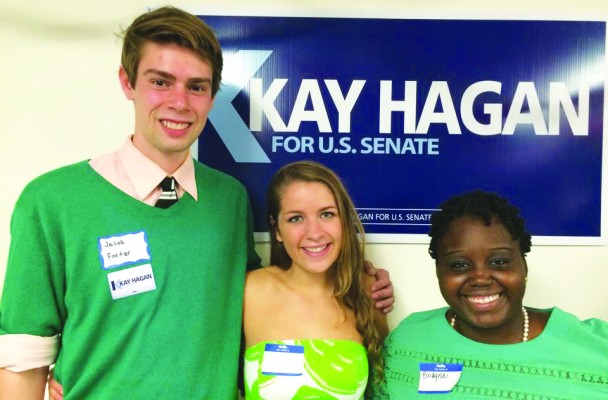HPU students intern with North Carolina senatorial campaigns

Jacob Foster and fellow HPU students work with Kay Hagan, candidate for U.S. Senate.
By Anne Davey, Opinion Editor //
This semester, High Point University students were afforded the opportunities to work for the largest and most high profile campaigns in the nation right here in North Carolina. North Carolina has become a major battleground swing state in recent elections, and as such it has received a lot of attention.
Media outlets from all over the country and political scientists are watching this race very carefully. High-profile politicians such as Hillary Clinton and Mitt Romney are coming in to endorse candidates because this race is critical for the United States Government.
North Carolina has been one of the most watched and funded senate races in the entire country this midterm election. What happens in this state matters significantly in the grand spectrum of politics for the nation.
Despite being a non-presidential year, the political climate this midterm election is intense. North Carolina is the prominent focus of these elections, with over $100 million being poured into the state. Thom Tillis is the Republican candidate, and Kay Hagan the Democratic incumbent. Libertarian candidate Sean Haugh is also on the ballot.
Students from HPU have been working on these campaigns, helping to get the word out to vote and spreading awareness about issues. While working for different organizations and engaged in different tasks, all of the students are advocates for voting and have articulated how critical this election has been.
Senior Jacob Foster has spent the past few months working on the democratic side of the Senate race. He explains the importance of elections and why this battle is so contentious in a simple manner: “As you may remember from a high school civics class, there are a total of 100 seats in the Senate. Between the two major parties, Republican and Democrat, there is a battle for one side to gain a majority of these seats, as it indicates whether Congress will vote conservatively or liberally for the next session.”
Junior Haston Gerencir says that because North Carolina is such a focus “it has been easy to get involved in a campaign and has been very rewarding.”
Gerencir has volunteered on one of the Senate campaigns, making phone calls, sorting mail, filing information and getting involved however possible because “any little difference actually helps tremendously, especially when every minute detail eventually is examined.”
Gerencir and Foster both credit their time on the campaign trail as educational. Students engaged in these competitive races have learned about fund raising, the importance of “Get Out The Vote” efforts and how much hard work and time goes into campaigns.
Junior Jessie Giaquinto has had the opportunity to intern with the North Carolina Republican Party in Guilford county. The NCGOP aids the Republican candidates on the ballot by organizing voter contact initiatives like phone calling and door knocking.
“Through my contact with the Guilford county electorate I’ve been able to discuss specific issues with people and I can see for myself how close this race is,” Giaquinto said.
Important issues such as gay marriage, contraceptives and voter ID laws are on the ballot in this election, as well as international problems such as ISIS and the ebola virus.
Gerencir plans on voting this year because “every vote counts.” The Senate is also responsible for confirming Supreme Court justices and approving proposed treaties, both of which directly affect the lives of voters.
Federal student loans and net neutrality laws also have major implications for students and soon-to-be college graduates.
Giaquinto further explains that “if you care about how much you are taxed and how your tax money is spent, you should never forget to vote.”
A large part of participating in campaigns, all of the students noted, include voter contact, asking for donations and informing citizens on issues and the candidate in order to gain support.
Getting out to vote is the last piece of the puzzle that needs completing. With issues that directly affect students, voting amongst young people is critical.
Voting is a right and a privilege, though one that most people do not take advantage of.
“On a more fundamental level, it is important to offer your input to what politicians you want in office. We the people can’t be surprised to have 13 percent approval ratings for Congress when we average less that 50 percent of the population turning out to vote,” Foster said.
In light of the competitive nature of American politics, voter turnout will continue to be critical and opportunities to get involved plentiful. HPU students have had unique advantages with hands on experience this election with their work on campaigns and every individual can make a similarly significant difference with their vote.